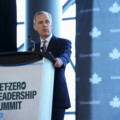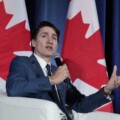Donald Trump sent shockwaves through the U.S. NGO ecosystem with his executive order which pauses federal funding, pending review, for organizations that are deemed to be “undermining national security.” What falls in this category is opaque, but generally speaking, the premise is that funding is paused until the Trump administration can review how money is being spent, specifically to ensure they aren’t using taxpayer money to fund organizations that undermine Trump’s policies. Regardless of what you might think of President Trump, the logic of this does make sense.
Ironically enough the same issue is also making headlines in Europe right now as well, where the European Commission has conceded that public funds have been used to fund NGOs who turn around and lobby MEPs for policy change.
Why does this matter for Canada? Well, it matters because we have this very same problem here in Canada, especially when it comes to public health lobbying.
In October, the self-appointed guardians of public health, Physicians For A Smoke-Free Canada, marched on Parliament Hill, demanding the resignation of Ya’ara Saks, minister of addictions, for her alleged failure to crack down on the vaping industry. They called for an end to all flavoured vapes, insisting that only tobacco flavour should be permitted, despite the fact that smokers trying to quit overwhelmingly rely on flavours to ditch cigarettes. Making vapes taste like the product people are trying to quit is a ludicrous proposition if there ever was one. Why should a product without tobacco mimic its noxious flavor, especially when it’s meant to help smokers quit, and 95 percent less harmful than smoking?
From the perspective of harm reduction, their crusade is a regressive misstep. The very essence of vaping is to provide an alternative to smoking, not to replicate its sensory experience. Yet, these activists, armed with myths about vaping’s efficacy in smoking cessation, push for policies that would make quitting harder, not easier.
The irony here is as thick as the smoke they seek to banish. Organizations like Physicians for a Smoke-Free Canada, which one might think would celebrate any smoke-free alternative, are curiously funded by the government, in an almost identical way as in Europe. In a dance of circular lobbying, this group, receiving up to 95 percent of its funding from public coffers, lobbies the same government for policy changes. This is not charity; this is an orchestrated echo chamber where taxpayer money funds the very advocacy that seeks to control taxpayer behaviour.
What we see here is not just a waste of public funds but a perversion of democracy. When the government pays to lobby itself, it erodes the independence of civil society, manipulates public discourse, and masks political maneuvering as public health advocacy. In 2022, Physicians for a Smoke-Free Canada, with more than half its revenue spent on just two employees’ salaries, exemplifies this corrupt process.
This circular “sock puppeting,” a term coined by Christopher Snowden at the Institute for Economic Affairs in London, isn’t limited to one organization, on one issue. Take the example of nicotine pouches, which don’t contain tobacco, don’t cause cancer, and are shown to not only be a useful tool to quit smoking but are also 99 percent less harmful than cigarettes. The Canadian Cancer Society, which received more than $27,000,000 from taxpayers in 2024, actively lobbied for heavy restrictions on this smoking cessation tool. Yes, the Canadian Cancer Society, while getting millions from taxpayers, turned around and lobbied Ottawa to restrict access to a product that doesn’t cause cancer.
Unfortunately, the same old song rings true on alcohol policy as well, where organizations historically tied to the prohibition movement peddle exaggerated risks about moderate alcohol consumption, again with you, the taxpayer, footing the bill for it.
The real scandal isn’t vape flavours, nicotine pouches, or alcohol-related pseudoscience; it’s the systemic corruption where the government funds its own critics to push policies against the public’s actual interest. This is not about health; it’s about control, disguised in the garb of concern. We should not, as taxpayers, fund our own fun policing, especially when it comes to the personal choices of adults.
This practice of self-lobbying must end. It’s unlikely to be ended by this government, especially with its narrowing shelf life, but it should be ended by the next. If Pierre Poilievre becomes Canada’s prime minister after the next election, he’ll have a fiscal mess to clean up, and circular lobbying should be one of the first cuts made. It’s time to call out these “sock puppets” for what they are—the fun police, funded by our own money, to limit our freedoms under the guise of protecting us.









